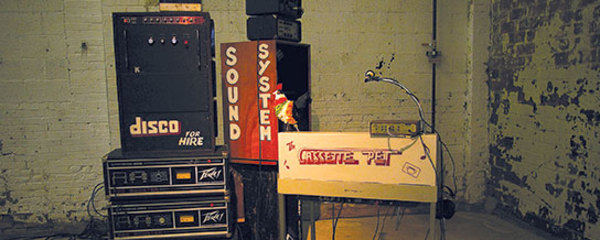Reinventing the Soundsystem
On October 26, 2006, Detroit’s newest contemporary art museum, MOCAD, opened its doors to the […]
Reinventing the Soundsystem
On October 26, 2006, Detroit’s newest contemporary art museum, MOCAD, opened its doors to the […]

On October 26, 2006, Detroit’s newest contemporary art museum, MOCAD, opened its doors to the public with a show called Meditations in an Emergency. The most compelling part of the exhibition was not Roxy Paine’s blob-making or Barry McGee’s and Amaze’s 30-foot high graffiti pieces–it was a one-man 1960s-style reggae soundsystem.
Inspired by Black Uhuru, early Upsetters records, and local radio, Detroit native Christopher Fachini (a former guitarist in The Dirtbombs and a current member of the Odu Afrobeat Orchestra) has spent the last seven years painstakingly putting together the soundsystem, which he calls The Mental Machine. The hub is the “Cassette Pet,” a mixer that Fachini uses to DJ cassettes of instrumental dub and rocksteady jams that he has written and recorded entirely by himself, playing all the instruments (organ, bass, percussion, etc.) on all the tracks. The sound plays through various amps and speaker stacks, one made entirely from rewired, fully functional boomboxes. All of the equipment is painted in the Jamaican style; Fachini even dresses not unlike Lee “Scratch” Perry when he plays.
“Reggae helped empower the people in Jamaica’s ghettos in the 1960s,” says exhibition curator Klaus Kertess. “Chris’ brilliant riffs on reggae carry on the possibility of liberation–if now in a more metaphorical sense than in the ’60s in Jamaica.”
Fachini is too wrapped up in mixing down the tracks for a forthcoming The Mental Machine album to be pondering the deeper significance of his pet project; nonetheless, he seems psyched to have his labor of love considered “art.” “I don’t even understand what I’m doing,” he says, when asked about the reaction of the MOCAD crowd to his performance. “But being in the museum has opened my eyes to a depth and a meaning in the piece that is, in a way, new even to me.”

